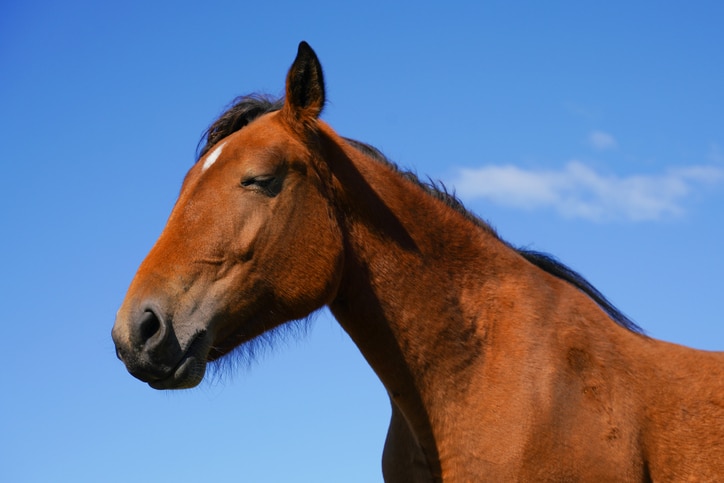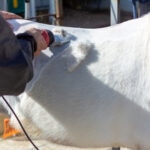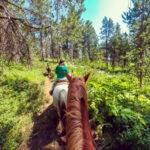Do Horses Sleep Standing Up?

Photo by Sergey Dolgikh/iStock / Getty Images Plus via Getty Images
Like humans, horses require sleep to remain healthy, but horses spend more time dozing while standing than lying down to sleep as people do.
How Do Horses Sleep?
Horses can sleep standing up or lying down to catch their Zs during multiple, usually short times throughout the day.
Like humans, horses experience different sleep stages, including light sleep, slow-wave sleep, and rapid eye movement (REM) sleep. However, the time a horse spends in each sleep stage and the position horses sleep in dramatically differs from human sleep patterns.
- Drowsiness or light sleep is the horse’s equivalent of a nap.
- Slow-wave sleep (SWS) is a deeper sleep stage during which the brain is not actively functioning. Horses transition between four phases during this time.
- REM sleep is necessary to allow the brain to process information and restore itself.
“I find how horses sleep fascinating,” says Amy McLean, PhD, an assistant professor of teaching at the UC Davis Department of Animal Science. “At shows, I like to turn off the barn lights at night because I think it helps them relax and lay down so they can get some REM sleep.”
Can Horses Sleep Standing Up?
If you’ve ever caught a horse dozing while standing, you might wonder, “How do horses sleep standing up?”
Horses’ legs have a “stay apparatus,” which is a group of tendons and ligaments in the front and back legs that act like a tension band. This ability mainly allows the horse to “lock” their limbs in the standing position without having to actively use skeletal muscles to hold themselves up.
Can Horses Lie Down to Sleep?
However, for REM sleep, the deepest sleep cycle, horses must lie down.
Research has found that horses generally require 30 minutes of REM sleep daily and can experience this sleep phase in both sternal recumbency (with their head supported by the ground or floor) and lateral recumbency (on their side).
Many horses enjoy sleeping on a bed of high-quality shavings—even better if the bedding is fresh, clean, and thick! Others like to sleep outdoors, lounging in the sun.
Recommended Product
You might find a sleeping horse twitching or snoring if you’re lucky enough to catch them deeply asleep.
“You may observe the ears moving back and forth from afar. Few horses will let you get close enough to watch their eye movements,” says Rebecca Gimenez Husted, BS, PhD, President/Owner and lead instructor of Technical Large Animal Emergency Rescue, “Some horses will “gallop” in their sleep or have random movements of their bodies.”
While REM is a critical sleep phase, lying down to sleep puts the horse in a vulnerable position. Domesticated horses who are comfortable in their surroundings are less likely to feel at risk, but it’s still an innate characteristic that prevents them from lying down for long periods. Beyond instinct, excessive lying down time can signal a physical problem.
“I usually tell people that if you notice a horse is laying down for more than 30 minutes at a time, [they] may have an issue like colic or arthritis,” says Husted.
How horses sleep is a relatively new research topic. To better understand their sleep cycles, electroencephalogram (EEG) monitors are used. A 2008 study by UC Davis’s neurology group used an EEG to measure the horse’s heart rate during sleep.
“They found the heart slows down during REM,” McLean says. “I tried to study this in mules in familiar and unfamiliar environments and found their heart rate remained elevated in the unfamiliar environment, and [they were in] a barn at a show, and the lights were left on.”
How Long Do Horses Sleep?
During a 24-hour period, a horse rests between three and five hours, but not all at once.
Horses are polyphasic sleepers, so their sleep occurs over multiple, short time frames throughout the day. Only about 30 minutes a day are dedicated to REM sleep when they sleep in lateral or sternal recumbency (down on the ground).
“Young foals spend many more minutes of their day sleeping in short bouts that tend to take up about 50% of their day until about 3 months of age, then taper off as they approach adulthood,” Husted explains. “Horses [who] are sick or [physically] debilitated may spend many more hours laying down than normal.”
However, Husted emphasizes that, just as in people, some horses may simply like to sleep for longer periods or need more sleep than others.
What Else Should I Know About How Horses Sleep?
Horses, like people, need sleep—especially REM sleep— to remain healthy physically and mentally.
In a herd mostly living outdoors, horses take turns lying down while others stand to serve as protectors.
In barns or turnout/stall living situations, horses may be less worried about the threat of predators but still limit the time spent stretching out in a deep sleep.
“I think the most important thing for sleeping in horses is that they feel safe and can lie down and get back up,” McLean says.
FAQs About Horse Sleep
Why do horses sleep standing up?
As prey animals, horses must be able to respond quickly to a threat. Standing up to sleep allows them to rest and recover physically while maintaining their ability to respond quickly if they are in danger.
How long can horses sleep standing up?
Horses are polyphasic sleepers, meaning they sleep for short periods of time. Research into equine sleep habits is relatively new and there is still much to learn about horse sleep cycles.
How do horses not fall over when sleeping?
Horses have a group of tendons and ligaments called the stay apparatus, which enables them to sleep while standing with little muscular effort.
How do horses lay down?
When horses lie down to sleep, they do so in one of two positions. During slow-wave sleep (SWS), they usually curl their legs under their bodies and may or may not rest their muzzle on the ground. In REM sleep, they often lay flat on their side with their neck and head on the ground.
Is it OK if a horse lies down to sleep?
Yes, it’s OK if a horse lies down to sleep. Husted says horses need to lie down for rapid eye movement (REM) sleep, which is a necessary sleep stage for all mammals for processing memory consolidation and restorative properties.
This content was medically reviewed by Kaela Schraer, DVM.




